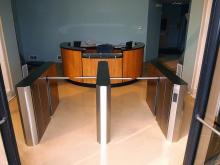
Access control systems are designed by FOUR Security to meet the specific security, operational, and data compliance requirements of our clients.
At FOUR Security, we believe that the design of an access control system should be made in collaboration with our clients, to ensure that it meets all of their requirements.
Appreciating a client’s operational requirements is vital to understanding for example, if there is a requirement to integrate with other systems and policies. These may include CCTV, contractor and visitor management policies, building occupational flow data and Data Protection Act compliance relating to the personal data that is gathered by the system.
Our systems are designed to support the integration of access control systems into operational and security infrastructure and ways of working, in order to maximise the operational benefits. We do this by working in collaboration with our clients throughout the duration of the project - from design to installation. We can also support the development of people processes and procedures aligned to access control protocols and of processes to ensure that the data collected is compliant with the Data Protection Act.
We consider that there are a number of operational benefits and challenges to consider when deciding which type of access control system will meet your operational requirements. The following points are examples of operational considerations;
OPERATIONAL BENEFITS
- The system should be designed to support the flow of building occupancy and support operational needs and priorities.
- It can be integrated into other security solutions including CCTV and other physical security options
- It is a very useful tool in helping building operators manage their fire risk and mitigation strategy, including insurance considerations.
- It can be used to understand peak demand periods of building occupancy and system log on, which in turn, helps determine IT use and future demands.
OPERATIONAL CHALLENGES
Deciding on whether the system is managed and operated by a third party supplier can have consequences when, for example, information is urgently required in the event of an investigation and access to the data is not readily available to building managers.
OTHER CHALLENGES INCLUDE:
- Data Protection Act compliance – inevitably, any access control system will collect a substantial amount of personal data that requires management in accordance with the Data Protection Act
- Integration of systems – Whether the system will be used to support operational processes and procedures, for example HR processes and policies (e.g. your joiners and leavers programme).
- How you manage contractor and visitor compliance to your policies (e.g. whether people wear their lanyards and cards is partly an issue of organisational culture).
SECURITY & OPERATIONAL RECOMMENDATIONS
- When deciding on installing or upgrading an access control system we recommend that:
- You undertake an evidence-based security risk assessment, demonstrating the operational need for an access control system that is designed to protect business critical assets and supports operational effectiveness.
- The design allows and enables the business to work effectively and does not unnecessarily restrict movement of people and goods.
- Your data is managed in accordance with DPA requirements, so it remains safe and secure.
Whatever the system chosen, we recommend that companies use their access control system to its full potential in support of their business priorities and they will then realise the many benefits to be obtained.
At FOUR Security, we provide consultancy advice on security Operational Requirement reviews and development. We also provide system design and feasibility; project management; quality control of third party suppliers and Data Protection Act compliance review and audit.
For more information please contact Adrian Wilmshurst, Chief Executive
Tel: 01780 755751





